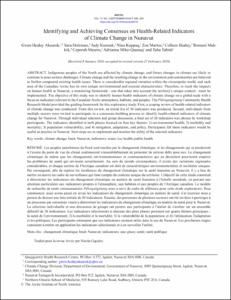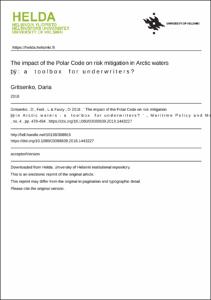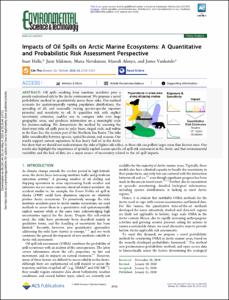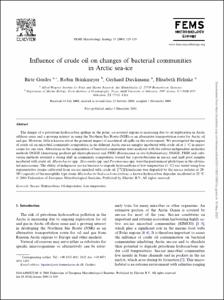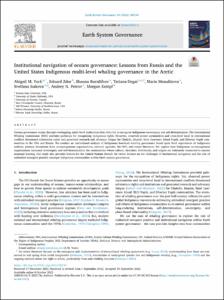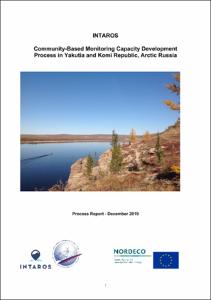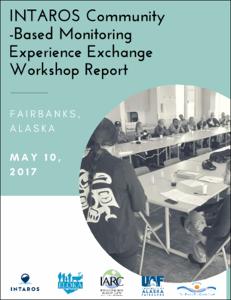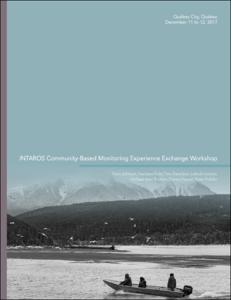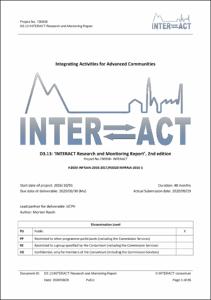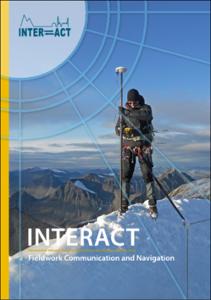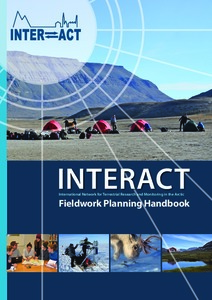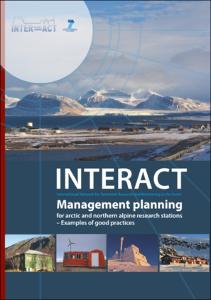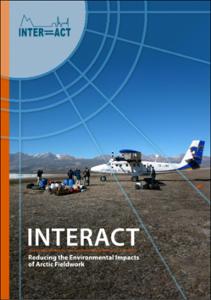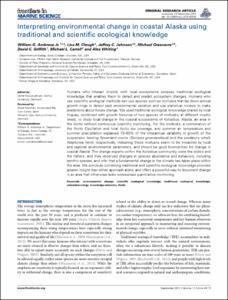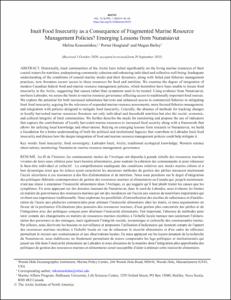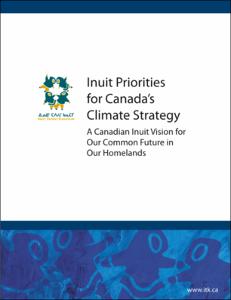Browsing CAPARDUS Practices by Title
Now showing items 120-139 of 244
-
Identifying and Achieving Consensus on Health-Related Indicators of Climate Change in Nunavut.
(2019)Indigenous peoples of the North are affected by climate change, and future changes in climate are likely to continue to pose serious challenges. Climate change and the resulting change in the environment and communities ... -
The impact of the Polar Code on risk mitigation in Arctic waters: a toolbox for underwriters?.
(2018)The existing risk weighing on vessel, crew and ecosystem in the Arctic and more globally in Polar waters promoted the adoption of the Polar Code (PC) early 2017, a mandatory international legal framework intended for ... -
Impacts of Oil Spills on Arctic Marine Ecosystems: A Quantitative and Probabilistic Risk Assessment Perspective.
(2020)Oil spills resulting from maritime accidents pose a poorly understood risk to the Arctic environment. We propose a novel probabilistic method to quantitatively assess these risks. Our method accounts for spatiotemporally ... -
Incorporating Inuit Societal Values.
(Government of Nunavut, Nunavut, 2013)This report is a compilation of the Government of Nunavut’s activities that reflect Inuit Qaujimajatuqangit (IQ) and Inuit Societal Values (ISV). The first section of the report identifies legislation with references to ... -
Influence of crude oil on changes of bacterial communities in Arctic sea-ice.
(2005)The danger of a petroleum hydrocarbon spillage in the polar, ice-covered regions is increasing due to oil exploration in Arctic offshore areas and a growing interest in using the Northern Sea Route (NSR) as an alternative ... -
Initial Alignment for SINS Based on Pseudo-Earth Frame in Polar Regions.
(2017)An accurate initial alignment must be required for inertial navigation system (INS). The performance of initial alignment directly affects the following navigation accuracy. However, the rapid convergence of meridians and ... -
Institutional navigation of oceans governance: Lessons from Russia and the United States Indigenous multi-level whaling governance in the Arctic.
(2022)Oceans governance occurs through overlapping, multi-level institutions that often fail to recognize Indigenous sovereignty and self-determination. The International Whaling Commission (IWC) provides pathways for recognizing ... -
INTAROS Community-Based Monitoring Capacity Development Process in Yakutia and Komi Republic, Arctic Russia.
(CSIPN, RIPOSR, NORDECO and INTAROS, 2019)INTAROS (Integrated Arctic Observing System) is an effort funded by the European Union to extend and improve existing and evolving observing systems that encompass the land, air and sea in the Arctic. INTAROS has been ... -
INTAROS Community-based Monitoring Experience Exchange Workshop Report, Fairbanks, Alaska, May 10, 2017.
(Yukon River Inter-Tribal Watershed Council (YRITWC), University of Alaska Fairbanks, ELOKA, and INTAROS (Integrated Arctic Observing System), Fairbanks, Alaska, USA, 2017)The workshop “Engaging Community-based Monitoring in Decision-Making and Assessment” was held May 10, 2017, in Fairbanks, Alaska. It offered an opportunity for practitioners of community-based monitoring (CBM) and observing ... -
INTAROS Community-Based Monitoring Experience Exchange Workshop Report, Québec City, Québec , December 11 to 12, 2017.
(Exchange for Local Observations and Knowledge of the Arctic (ELOKA), Nordic Foundation for Development and Ecology (NORDECO), Yukon River Inter-Tribal Watershed Council (YRITWC), International Arctic Research Center (IARC) at University of Alaska Fairbanks (UAF), and Integrated Arctic Observation System (INTAROS), Québec City, Canada, 2018)This INTAROS Community-Based Monitoring Workshop was held in Québec at the Québec Convention Centre on December 11-12, 2017 concurrently with the Arctic Change 2017 Conference. The workshop offered an opportunity for ... -
An integrative climate change vulnerability index for Arctic aviation and marine transportation.
(2019)Climate change vulnerability research methods are often divergent, drawing from siloed biophysical risk approaches or social-contextual frameworks, lacking methods for integrative approaches. This substantial gap has been ... -
INTERACT Research and Monitoring Report 2020. D3.13. 2nd edition
(INTERACT Consortium, 2020)The Arctic is still an understudied part of the world, and restricted access or lack of infrastructure makes arctic research more complicated than elsewhere. Coordinating activities, implementing standards and data ... -
INTERACT Fieldwork Communication and Navigation.
(Aarhus University, DCE – Danish Centre for Environment and Energy, Aarhus, Denmark, 2021)When preparing for fieldwork, there is a wealth of things to keep in mind and to make decisions about. Communication and navigation are essential elements of conducting science in cold and remote areas of the world. ... -
INTERACT Fieldwork Planning Handbook.
(Aarhus University, DCE – Danish Centre for Environment and Energy, Denmark, 2019)The INTERACT Fieldwork Planning Handbook has been produced within the framework of the EU Horizon 2020 infrastructure project INTERACT. It aims to ensure that you are well prepared for fieldwork at INTERACT stations and ... -
INTERACT Management planning for Arctic and northern alpine research stations – Examples of good practices.
(Aarhus University, DCE – Danish Centre for Enviroment and Energy, Aarhus, Denmark, 2014)This book is about management of arctic and northern alpine research stations. It has been produced by a group of station managers participating in the EU 7th Framework Programme Infrastructure project called INTERACT. ... -
INTERACT Practical Field Guide.
(Aarhus University, DCE – Danish Centre for Environment and Energy, Denmark, 2019)The INTERACT Practical Field Guide contains information on best practices and safety aspects in relation to fieldwork in the Arctic. Its eight chapters address general safety guidelines; communication; safety during ... -
INTERACT Reducing the Environmental Impacts of Arctic Fieldwork.
(Aarhus University, DCE – Danish Centre for Environment and Energy, Aarhus, Denmark, 2021)The environmental impacts of fieldwork at and around research stations may be small in comparison to the impacts of all other human activities and in relation to the often vast and remote areas in which the fieldwork ... -
Interpreting environmental change in coastal Alaska using traditional and scientific ecological knowledge.
(2014)Humans who interact directly with local ecosystems possess traditional ecological knowledge that enables them to detect and predict ecosystem changes. Humans who use scientific ecological methods can use species such as ... -
Inuit Food Insecurity as a Consequence of Fragmented Marine Resource Management Policies? Emerging Lessons from Nunatsiavut.
(2021)Historically, Inuit communities of the Arctic have relied significantly on the living marine resources of their coastal waters for nutrition, underpinning community cohesion and enhancing individual and collective well-being. ... -
Inuit Priorities for Canada’s Climate Strategy: A Canadian Inuit Vision for Our Common Future in Our Homelands.
(Inuit Tapiriit Kanatami,, Ottawa, Canada, 2016)This report provides First Ministers and Canadian stakeholders with an overview of the diverse and growing needs Canadian Inuit face as we adapt to climate change in Inuit Nunangat, the Inuit homeland spanning four ...
 Repository of community practices in Ocean Research, Applications and Data/Information Management
Repository of community practices in Ocean Research, Applications and Data/Information Management
